Key Takeaways
- Divorce can significantly reduce your pension and benefits, and understanding how your federal retirement assets are divided is essential for securing your financial future.
- Timing is crucial: the division of your pension, TSP, and benefits depends on the duration of your marriage and the specifics of your divorce decree, which can impact your retirement timeline and monthly income.
The Reality of Divorce and Your Federal Retirement
- Also Read: Divorce and Your Federal Pension—What Happens When You Split Assets and How It Could Affect Your TSP
- Also Read: What Happens to Your Federal Benefits After Divorce? Here’s the Lowdown
- Also Read: The Best FEHB Plans for 2025: Which One Fits Your Lifestyle and Budget the Best?
As a federal worker, your retirement plan is more than just your personal nest egg—it’s likely one of the largest assets in your divorce settlement. So, how does splitting these assets affect your federal retirement? Let’s break it down.
What’s at Stake in a Divorce?
In a federal divorce, there are multiple assets to consider, each with its own set of rules for division. The most prominent ones include:
- FERS or CSRS pension: The pension you’ve earned through your years of service is subject to division during a divorce. Whether you’re under the Federal Employees Retirement System (FERS) or the Civil Service Retirement System (CSRS), your spouse could be entitled to a portion of your monthly annuity.
- Thrift Savings Plan (TSP): Similar to a 401(k), the TSP is another major asset that can be split. It’s subject to a court order, and the division can be based on a percentage or a specific dollar amount.
- Federal Employees Health Benefits (FEHB): If your spouse was covered under your FEHB plan, divorce could mean they lose this coverage unless the divorce decree specifies otherwise. They may need to seek alternative healthcare options.
- Survivor benefits: This part of your retirement package ensures that a spouse continues to receive benefits if you pass away. However, divorce could alter or eliminate these benefits depending on the agreements reached in court.
Understanding how these assets are divided will help you protect your financial future.
How Pensions Get Split: FERS vs. CSRS
Dividing a federal pension can be one of the trickiest parts of a divorce settlement. Whether you’re under FERS or CSRS, your pension is considered a marital asset, and your spouse may be entitled to a portion based on your years of service during the marriage.
- FERS: If you’re a FERS employee, your pension is typically divided using a court order known as a Court Order Acceptable for Processing (COAP). This order will spell out how much of your monthly pension your ex-spouse will receive. If you’ve worked for the federal government for 20 years, and 15 of those were while you were married, your spouse could be entitled to half of those 15 years’ worth of pension earnings.
- CSRS: For those under the CSRS system, the process is quite similar, though the payout can be more substantial due to the larger pension amounts. Here, too, the COAP will dictate the division, and your ex-spouse may receive a percentage of your monthly retirement check.
The specific amount that your spouse will receive depends on various factors, including the duration of your marriage and the terms laid out in your divorce decree.
TSP: The 401(k) of Federal Employees
The TSP, much like private-sector retirement accounts, can be divided during a divorce. This division doesn’t happen automatically—you’ll need a court order specifying the amount or percentage that will go to your spouse. There are two primary ways the TSP can be split:
- Percentage of the account balance: A court may order that your spouse receives a specific percentage of your TSP balance as of a certain date. For example, if you have $300,000 in your TSP, and your divorce settlement grants your spouse 50%, they would receive $150,000.
- Dollar amount: Alternatively, the court may specify a fixed dollar amount that your spouse will receive from your TSP.
One important note: Dividing your TSP doesn’t necessarily mean an immediate payout. Instead, the funds may be transferred to your spouse’s individual retirement account (IRA) or another qualified retirement plan. This avoids early withdrawal penalties, but taxes will apply when they eventually withdraw the funds.
Health Benefits: Will Your Spouse Lose FEHB Coverage?
Federal employees enjoy some of the most comprehensive health insurance coverage through the Federal Employees Health Benefits (FEHB) program. But divorce changes things.
After the divorce is finalized, your spouse will lose access to your FEHB coverage unless the court order or your divorce decree provides for continued coverage, often through something called Temporary Continuation of Coverage (TCC). TCC allows your ex-spouse to remain on your health insurance for up to 36 months, but it’s costly because they’ll have to pay the full premium, including the government’s portion.
Survivor Benefits: Protecting Your Spouse After You’re Gone
Survivor benefits are a key component of your federal retirement package, ensuring that your spouse receives a portion of your pension if you pass away. However, divorce can affect these benefits.
- FERS: If your divorce decree grants your ex-spouse survivor benefits, they will continue to receive a portion of your pension after your death. If no survivor benefits are awarded, they won’t receive anything. Keep in mind that granting survivor benefits usually results in a reduction to your monthly pension while you’re alive.
- CSRS: The same rules apply to CSRS retirees, though the survivor benefit amounts are typically larger due to the size of the CSRS pension.
Without proper survivor benefit planning, your ex-spouse could lose a significant source of income.
Timing and Duration of Marriage: A Crucial Factor
The duration of your marriage plays a crucial role in how your federal retirement assets are divided. The longer your marriage, the larger the portion of your pension, TSP, and other benefits that your spouse may be entitled to. If your marriage lasted 10 years or longer while you were a federal employee, your ex-spouse may be entitled to a larger share of your retirement assets.
For example, if you were married for 25 years while working for the federal government, your spouse could potentially receive half of the pension earned during those years, along with a portion of your TSP balance. Conversely, a shorter marriage would result in a smaller share of your retirement assets.
What Should You Be Thinking About?
If you’re going through a divorce, or even considering one, now is the time to understand how it will impact your federal retirement. The division of your pension, TSP, and benefits will affect your financial security. You may not be able to control every outcome in your divorce settlement, but understanding your options and working with a knowledgeable advisor can help minimize the financial impact.
The Financial Consequences of Splitting Federal Retirement Benefits
When assets like pensions and TSP balances are divided in a divorce, your monthly retirement income will take a hit. It’s vital to plan ahead, factoring in how much less you’ll have to live on after the split. Will you still be able to retire on time? Will you need to make additional TSP contributions to make up for the lost funds?
Don’t forget to consider health insurance, especially if your spouse was relying on your FEHB coverage. The loss of these benefits can create an additional financial burden that needs to be accounted for.
Plan Now for a Secure Future
Divorce may complicate your retirement plans, but with the right approach, you can still enjoy a secure financial future. By understanding how your federal retirement assets are divided and taking steps to protect them, you’ll be better prepared for what lies ahead.













